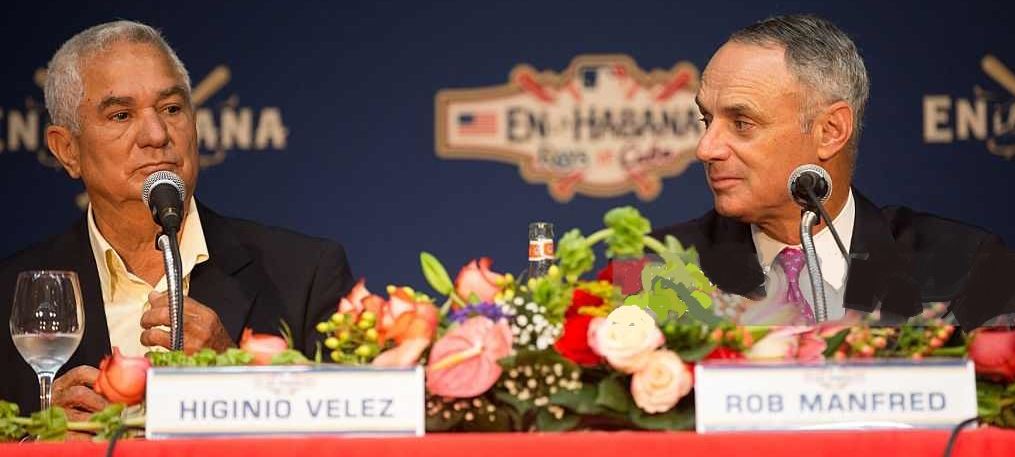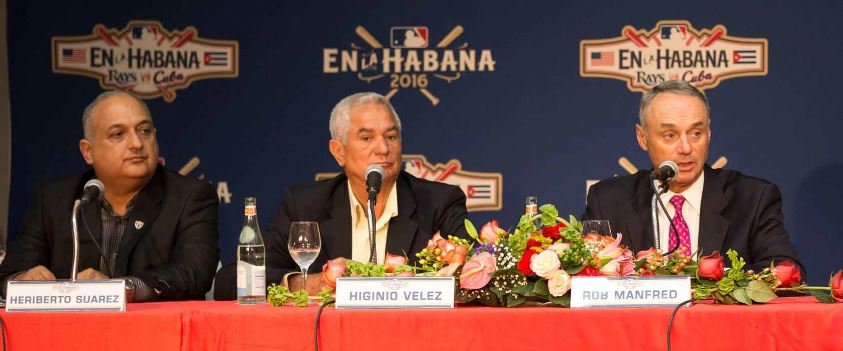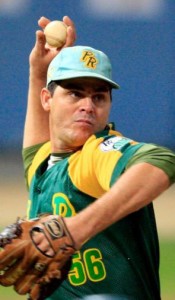
Politics in baseball — a force play
What’s interesting about politics is that, by changing some words, people can claim advances without ever changing anything. The bad thing about that practice is that it generates expectations when, in fact, conditions have not changed.
That’s just what’s happening with relations between Cuban baseball and the Major Leagues (MLB) in the U.S.
No matter what people mean to say, no matter what MLB Commissioner Robert B. Manfred and his entourage said at a meeting in Havana with Higinio Vélez, head of the Cuban Baseball Federation (FCB), no matter that the Tampa Bay Rays played the Cuban nationals last month in Havana (and won, of course), the fact is that, one year and three months after Dec. 17, 2014, the real conditions for the arrival of Cuban players to the Major Leagues have not changed.
And I’m speaking about basics, not just handshakes and promises or the opening of offices for MLB auxiliaries in Havana. Unfortunately, for the Cuban baseball players who wish to play in the Big Tent, there’s only one way — they must quit Cuba.
Five days before President Obama’s visit to the island, the U.S. Treasury Department published a series of measures involving an economic rapprochement and “support” for the private entrepreneurs in Cuba.
Two paragraphs in the package stood out. They said that “Cuban nationals in the United States in a non-immigrant status or pursuant to other non-immigrant travel authorization will be authorized to earn a salary or compensation, consistent with the terms of the particular visa, provided that the recipient is not subject to any special tax assessments in Cuba.”

Within that group of Cuban citizens, the measures published by the Treasury Department and the Office of Foreign Assets Control (OFAC) refer directly to the athletes.
That’s fine, one might think. After all, without settling in the United States or renouncing Cuba as the country of residence (not required by law, at least explicitly), a Cuban citizen can work and receive a salary on U.S. soil. That’s fine, isn’t it?
But let’s return to a key sentence in the text — “provided that the recipient is not subject to any special tax assessments in Cuba.”
In other words, you, your neighbor or I myself could receive a salary in the U.S. for our work, even if we are Cubans, so long as we disobey the tax commitments we have legally established with the Cuban government, a commitment observed by all the citizens of every country, especially U.S. citizens.
There would be a choice, then. Either we ignore the Cuban internal revenue laws (i.e., engage in tax fraud), committing a violation punishable by heavy fines or even prison, or we collect the money and quit our homeland. Not a complicated choice, right?
Yes, at first sight we might think that it is a step forward, and in a theoretical way it is. It is no longer obligatory to reside outside Cuba, but now we are asked to break our own laws. Laws, it should be said, that in no way contradict or are different from the laws established in all other countries for similar situations.
Months ago, the OFAC itself had circulated a set of measures that purportedly sought to eliminate the human trafficking in Cuban baseball players who attempted to go to the United States.
However, it set some very clear rules. The players had to prove that they held permanent residence in a third country and had to sign a document in which they swore that they had terminated all relations with Cuba. Further, they had to deny any ties to Cuban political organizations and had to promise that they had no intention to return to the island.
The new pronouncements by the U.S. Treasury Department are a lot more refined, by far. It’s hard to say that they’ve twisted the language, but the words are pretty much the same. They’re just a variation on the same policy — the same dog with a more stylized collar.
Nothing has changed. The blackmail remains intact. Do you want to play in the MLB? Simple. Break your country’s laws or go live outside your country.
Amid the media hoopla during Obama’s visit to Cuba, the top baseball officials from both countries sat down at the same table in Havana.
Manfred and his people spoke of a bright-shining future, of a space through which Cuban talent might enter the MLB, of offices for the representation of ballplayers in Cuba, and of spring training on the island. They also said that the task won’t be easy, that a long road looms ahead and that the MLB will continue to obey the laws of the United States.
Displaying unusual serenity, Higinio and his people confirmed that all progress is welcome, that Cuba is agreeable to horizontal negotiation, that we still have enough talent to inject into the Big Tent’s bloodstream.

“We don’t want our players to be treated differently, we don’t want privileges,” Vélez said at a press conference then. “We’re taking the same steps in unison to achieve a relationship, but without forcing the Cuban players to quit their homeland, that is, their residence in Cuba.”
The Cuban official made it clear that his Federation won’t renounce the policy established by the National Institute of Sports, Physical Education and Recreation (INDER) in 2014. That policy leaves it up to each National Federation to hire its athletes by paying a legal representation fee that seeks to compensate in some way the investment made in the formation of each athlete.
So far, some aspects are certain. First, both parties are ready to negotiate. Second, the terms of those negotiations (at least the visible terms) continue to make an understanding possible — at least for now.
“We’re working at it. These are complex matters but we want a normal relationship,” said the MLB commissioner in Havana. I suppose we should ask Mr. Manfred what he understands as “normal.”
Meanwhile — and we should acknowledge that in this instance the Cuban Baseball Federation is right — the players’ big aspiration remains very simple. Pitcher Yosvani Torres states it very clearly: “I hope I won’t have to renounce living in my homeland in order to play in the Major Leagues.”
[Photo at top: Higinio Vélez, left, president of the Cuban Baseball Federation, and Robert Manfred, commissioner of Major League Baseball, meeting in Havana in March.]


